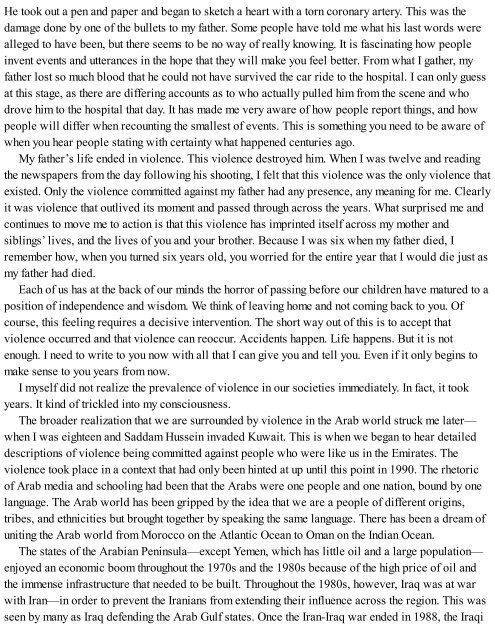1250119847
Create successful ePaper yourself
Turn your PDF publications into a flip-book with our unique Google optimized e-Paper software.
He took out a pen and paper and began to sketch a heart with a torn coronary artery. This was the<br />
damage done by one of the bullets to my father. Some people have told me what his last words were<br />
alleged to have been, but there seems to be no way of really knowing. It is fascinating how people<br />
invent events and utterances in the hope that they will make you feel better. From what I gather, my<br />
father lost so much blood that he could not have survived the car ride to the hospital. I can only guess<br />
at this stage, as there are differing accounts as to who actually pulled him from the scene and who<br />
drove him to the hospital that day. It has made me very aware of how people report things, and how<br />
people will differ when recounting the smallest of events. This is something you need to be aware of<br />
when you hear people stating with certainty what happened centuries ago.<br />
My father’s life ended in violence. This violence destroyed him. When I was twelve and reading<br />
the newspapers from the day following his shooting, I felt that this violence was the only violence that<br />
existed. Only the violence committed against my father had any presence, any meaning for me. Clearly<br />
it was violence that outlived its moment and passed through across the years. What surprised me and<br />
continues to move me to action is that this violence has imprinted itself across my mother and<br />
siblings’ lives, and the lives of you and your brother. Because I was six when my father died, I<br />
remember how, when you turned six years old, you worried for the entire year that I would die just as<br />
my father had died.<br />
Each of us has at the back of our minds the horror of passing before our children have matured to a<br />
position of independence and wisdom. We think of leaving home and not coming back to you. Of<br />
course, this feeling requires a decisive intervention. The short way out of this is to accept that<br />
violence occurred and that violence can reoccur. Accidents happen. Life happens. But it is not<br />
enough. I need to write to you now with all that I can give you and tell you. Even if it only begins to<br />
make sense to you years from now.<br />
I myself did not realize the prevalence of violence in our societies immediately. In fact, it took<br />
years. It kind of trickled into my consciousness.<br />
The broader realization that we are surrounded by violence in the Arab world struck me later—<br />
when I was eighteen and Saddam Hussein invaded Kuwait. This is when we began to hear detailed<br />
descriptions of violence being committed against people who were like us in the Emirates. The<br />
violence took place in a context that had only been hinted at up until this point in 1990. The rhetoric<br />
of Arab media and schooling had been that the Arabs were one people and one nation, bound by one<br />
language. The Arab world has been gripped by the idea that we are a people of different origins,<br />
tribes, and ethnicities but brought together by speaking the same language. There has been a dream of<br />
uniting the Arab world from Morocco on the Atlantic Ocean to Oman on the Indian Ocean.<br />
The states of the Arabian Peninsula—except Yemen, which has little oil and a large population—<br />
enjoyed an economic boom throughout the 1970s and the 1980s because of the high price of oil and<br />
the immense infrastructure that needed to be built. Throughout the 1980s, however, Iraq was at war<br />
with Iran—in order to prevent the Iranians from extending their influence across the region. This was<br />
seen by many as Iraq defending the Arab Gulf states. Once the Iran-Iraq war ended in 1988, the Iraqi
















